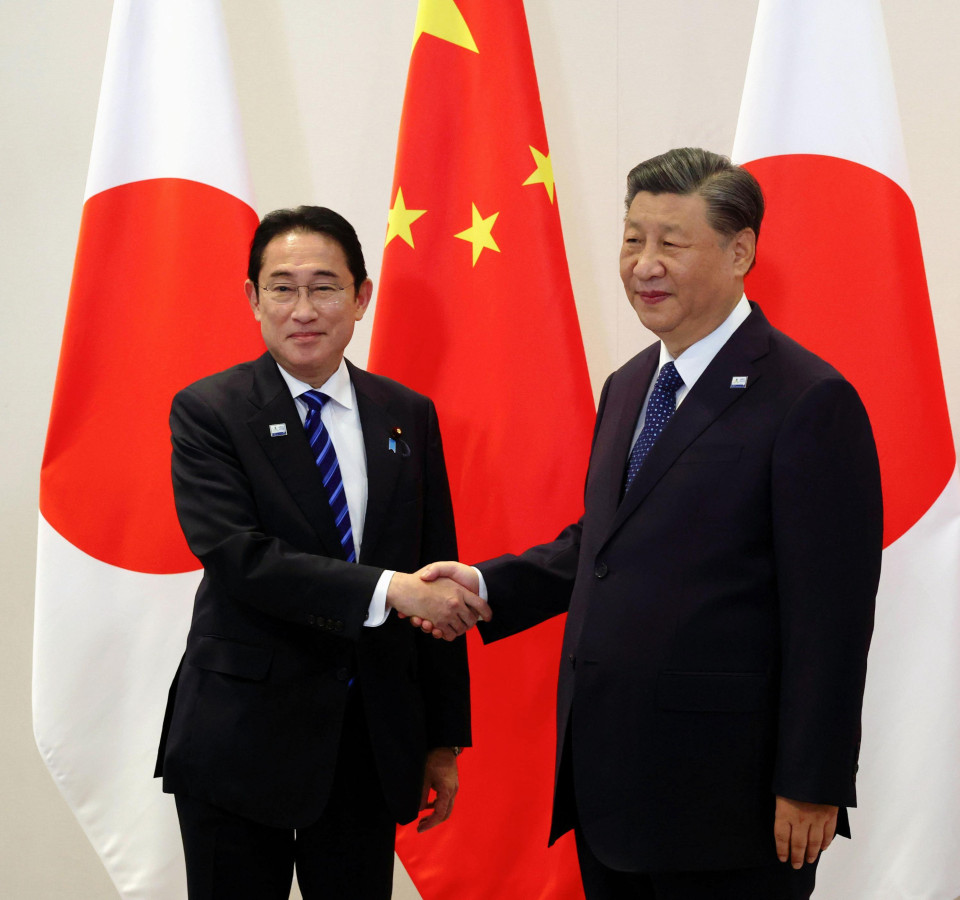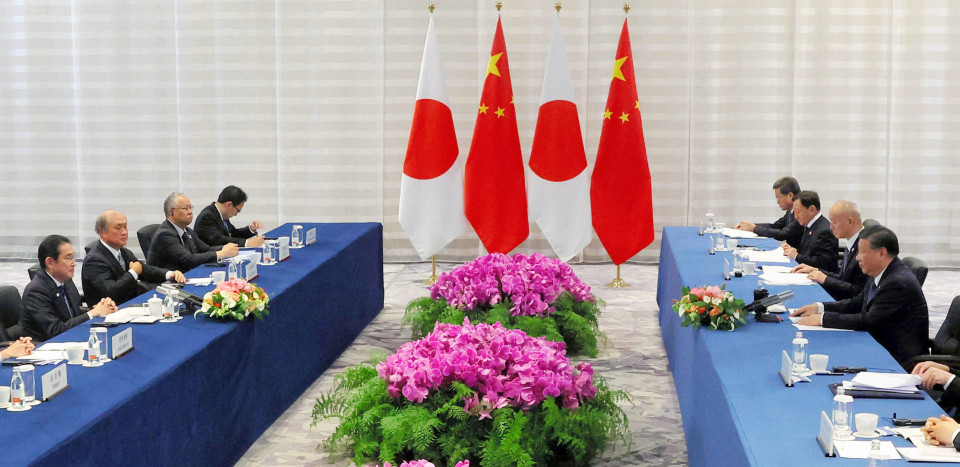Japanese Prime Minister Fumio Kishida and Chinese President Xi Jinping agreed Thursday to build "mutually beneficial" bilateral relations based on common strategic interests, despite what Tokyo views as an "unscientific" import ban on its seafood and a host of other pending issues.
At their first face-to-face meeting in a year, Kishida said both sides agreed to hold expert consultations on Japan's release of treated radioactive water from the crippled Fukushima Daiichi nuclear power plant into the sea, a source of recent bilateral tensions.
While Kishida demanded the restriction be removed immediately, China's official Xinhua News Agency quoted Xi as urging Japan to "properly" address the discharge of "nuclear-contaminated water" for "the health of all humankind" and "the global marine environment."
Beijing apparently did not make concessions over other issues, including its detention of Japanese nationals and growing military provocations in the Taiwan Strait, pointing to a long road ahead for bilateral ties.

Kishida told reporters after meeting with Xi in San Francisco, where the Asia-Pacific Economic Cooperation summit was taking place, "We agreed on where we are heading. That is to build constructive and stable relations."
Prior to the 65-minute meeting, Kishida said Japan should say "what should be said" to China, a key neighbor and trading partner. But he was also seeking to strike a balance by stressing that both sides must focus on common interests, which would benefit the region and beyond.
Kishida and Xi exchanged their views in a relaxed environment, although many topics were left unresolved, a senior Japanese official said.
"The international community is at a historic turning point where confrontation and cooperation are woven in a complicated manner," Kishida told Xi at the outset of their talks, a day after a U.S.-China summit.
"In that environment, Japan and China, as neighbors that share a long history and ever-lasting future, and as major global powers, have the responsibility of contributing to global peace and prosperity," Kishida said.
Xi said bilateral ties should be "mutually beneficial" and appropriate for a new era, adding that the two countries should "properly handle differences" for the common interests of their peoples, according to Chinese state-run media.
Japan and China have developed relations based on the principles outlined in four political documents signed in 1972, 1978, 1998, and 2008. The latest document stipulates that the two nations should advance strategic and mutually beneficial ties.
The phrase, however, had not been mentioned by the two countries in recent years as they have been at odds over various issues, including territorial claims and Taiwan, which China regards as a renegade province to be unified with the mainland, by force if necessary.

As for the treated water from the nuclear plant damaged in the wake of a massive March 2011 earthquake and tsunami in northeastern Japan, it contains tritium at levels below the permitted limit under Japanese safety standards.
Kishida told reporters that Japan and China will engage in discussions on the water "from a scientific perspective at the level of experts."
China's rise as a military and economic power, meanwhile, has sent ripples across the Indo-Pacific region and beyond. Alarmed by Beijing's assertive behavior, Japan is promoting a "free and open" rules-based international order.
During the meeting, Kishida expressed his serious concern about the situation in the East China Sea, where Chinese patrol ships have been repeatedly spotted off the Senkaku Islands, a group of islets administered by Japan but claimed by China.
The prime minister also sounded the alarm about China's increased military activities with Russia around the Japanese archipelago while noting that peace and stability across the Taiwan Strait are critically important for Japan and the world.
Xi emphasized that Japan "must ensure that the foundation of bilateral relations will not be damaged or shaken," Xinhua reported, in a jab at Japan's close security ally, the United States, which has bolstered its involvement in Taiwan.
Earlier this month, Japan's top national security adviser, Takeo Akiba, visited Beijing and held talks for three and a half hours with China's top diplomat, Wang Yi, with preparations for the summit believed to be on the agenda.
This year marks the 45th anniversary of the signing of the bilateral peace and friendship treaty between the Asian neighbors.
Related coverage:
Japan urges lifting of seafood ban by China, Russia at WTO session










